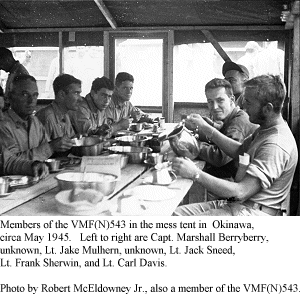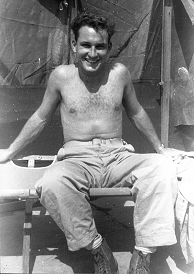 In 1942, when the first Marine night fighter squadrons were formed, the
Japanese had practically complete control of the skies in the combat areas,
he said.
In 1942, when the first Marine night fighter squadrons were formed, the
Japanese had practically complete control of the skies in the combat areas,
he said.
SAN DIEGO - In May 2004 I was one of nearly 100 people who attended the annual reunion of the Marine Night Fighters Association.
I was there out of curiosity and to honor my late father, Frank Sherwin, who was a Marine night-fighter pilot in the Pacific during WWII.
My brother, also named Frank Sherwin, conveniently lives in El Cajon so we came to the reunion with his son, Roy, 8.
The WWII and Korea-era vets, their wives and a handful of adult children who gathered in San Diego were warm and welcoming, even though we were newcomers to the organization and weren't staying at the hotel with the rest of the group.
On Friday morning, May 14, we all gathered on the parade grounds at the Marine Corps Recruit Depot to watch the basic Marine graduation ceremony. It was at that point that I thought: "What am I doing here? I don't want to celebrate the choices these kids made, choices that might end up getting them killed in Iraq."
But I bit my lip and settled back in the bleachers, watching the proceedings, which began exactly on time. With military precision, actually. The Marine band was the hardest working unit on the parade grounds but all the recruits looked good -- spit-shined and professional. It was the sloppily dressed civilians - the wives, mothers and fathers, girlfriends -- who straggled in up to halfway through the ceremony wearing T-shirts and shorts or blue jeans that needed a dress manual.
The group I was sitting with, the Marines who fought in WWII and Korea, were recognized by the emcee and asked to stand, receiving a polite round of applause. It seemed to me that these good men deserved more than just a pro forma nod of the head, but their story is not well known.
John D'Addamio of York, Pa., the association's newsletter editor, agrees that their story is not well known.
 In 1942, when the first Marine night fighter squadrons were formed, the
Japanese had practically complete control of the skies in the combat areas,
he said.
In 1942, when the first Marine night fighter squadrons were formed, the
Japanese had practically complete control of the skies in the combat areas,
he said.
"They had night navigation capabilities, but we had no means of intercepting them. In 1942, a cadre of men were sent to England to study their radar system. Upon their return they immediately applied what they had learned and our first night fighter squadron (531) was formed and served in the Guadalcanal campaign," D'Addamio said.
"The first night fighter aircraft was a Navy discard, a patrol bomber, whose limitations were duly noted. During this period of trial and error, a second night fighter squadron, 532, was being formed, as was AWS 1 (Air Warning Squadron). It was the job of AWS's to direct the fighter planes to targets, provide radio beacons to direct them home, provide anti-aircraft fire control, and myriad other duties required to make things work.
"This combination would bring some sophistication to our night-fighting capabilities and gave us the opportunity to intercept and shoot down enemy bombers as they approached our bases at night," he said. "Many times, the enemy was turned away without dropping a bomb on any of our installations," he added.
"For the first few years of WWII, I think nine night fighter squadrons and 18 air warning squadrons were commissioned. Many night fighter squadrons served in all the major campaigns, while all of them served in the final campaign of the Pacific, Okinawa," said D'Addamio.
Marine night fighters also were active in Korea.
"This doesn't sound like much by today's standards, but imagine flying alone in absolute, total darkness, with only some crackling voice directing you toward someone who wants to shoot you down," he suggested.
"Your life depended on a controller to get you behind the enemy bomber, then your onboard radar would guide you in for the final approach. As soon as you took your shot, you had to veer away to avoid possible flames, explosion and flying debris. Totally disoriented in the darkness, you now pray for the ground to beam you a homing frequency to get you back to your field," he said.
"These pilots were a special breed of men," he added.
Yes, they were. I agree with that assessment, so it was important if not politically correct for me to ask one of the Marines what he thought of our current war in Iraq.
At the dinner on Saturday night we were seated by squadron. Only one man from my father's squadron attended the reunion, and I was happy to meet him. Fred Ballek of Hampstead, North Carolina, had been an 18-year-old truck driver during WWII. He didn't know my father (he called all the pilots "sir") but I appreciated hearing his stories and the story of his life after the war.
Ballek made a career out of the Marines. He later served as a city councilman and mayor of a small town. He worked hard to support his family including his grandchildren. He attended the reunion with his wife, Gloria, and his adult daughter and her partner, also a Marine.
Ballek was kind enough to give me a wonderful souvenir of the war, a 1942 Christmas card that Marines were encouraged to send home to their families and friends that critical season.
I liked this good man, but I still wanted to put the question to him. I hoped it wouldn't bring our lovely dinner to an end. Finally, I asked: "What do you think of the U.S. in Iraq?"
His answer delighted me.
"The United States acted like a bully," he said. We chatted a little about the options open to the U.S. now and our brief evening together ended pleasantly.
Later I thought about the basic rules of human behavior and how the U.S., armed with the best intentions, violated them.
Any student of human behavior will tell you: The only person you can change is yourself. This applies to countries as well as individuals. The United States should concentrate on making itself the best country in the world, and then other countries might follow, if it suits them. Democracy imposed by force is something other than democracy.
Or to put it in Marine terms: Honor, courage and commitment don't leave room for bullying.
--Reach Elisabeth Sherwin at gizmo@dcn.org
To inquire about ordering any of the above mentioned books from an independent bookstore,
Lt. Frank Sherwin, pilot with the VMF(N)543 serving his country from Okinawa in May 1945. Follow this link to theJune 16, 2002 feature in the Davis Enterprise and part of PRINTED MATTER ON THE WEB Caption by G. Richard Yamagata
Photo by Robert McEldowney, Jr. ©2002 All rights reserved. Used with permission.
Bogey's Books at discounted prices [ Click Here ]
[Author Menu] [Date Menu] [Genre Menu] [Home Page] [Links] [Sponsors]

The Davis Virtual Market || Davis Community Network ![]()
![]()